Search Results for 'asked'
-
AuthorSearch Results
-
February 5, 2026 at 11:51 pm #8055
In reply to: The Hoards of Sanctorum AD26
Helier watched Yvoise squinting at the bone through her screen, trying to decipher the “map” amidst the noxious fumes. He observed the scene with a detachment that surprised him.
The room was vibrating with tension, but for once, it wasn’t coming from Yvoise —it was directed at her. She was standing by the window, phone pressed to her ear, nodding furiously at some invisible bureaucrat on the other end.
“I am violently in agreement with you, Mr. Prufrock,” she was saying, her voice tight but diplomatic. “The olfactory output of Unit 26 is indeed non-compliant with the Olympus Park Clean Air protocols. We are… rectifying the asset.”
It was the “Kyber-Auditor” from the Business Park Administration. The new management had been cracking down lately, restricting their “unauthorized usage” of miracles and enforcing standard operating procedures.
It was all too much noise. Above the smell, which was screaming of decay rather than play, there was the frantic energy of it all. Mrs. Fennel’s panic, Yvoise’s spreadsheets, the looming threat of this “Varlet” from the Council. It was pure Negotium, the active denial of peace, waging war on the idle time of the Romans: Otium. The world was demanding relentlessly that they justify their existence with hygiene certificates, clean surfaces, and significantly fewer piled-up treasures, branding their sacred collections as mere “trip hazards.”
Helier gripped the bamboo handle of his umbrella —a sturdy, shepherd-style thing he had almost tossed into the ‘Charity Pile’ yesterday. He felt a sudden, fierce longing for Otium, a sacred pause where one simply is.
Earlier that morning, a delivery guy had held the elevator door for him with a foot, balancing a mountain of cardboard boxes. A simple, clumsy gesture of kindness amidst the clutter. It had stayed with Helier. It reminded him that you could be overloaded and still have grace. That moment of suspension, of courteous stillness in the middle of the rush, had been a tiny bubble of Otium.
They needed that bubble now. They needed to stop the clock.
Spirius, who had been hovering in the doorway, seemed to hear Helier’s thought.
“A map is useless if you pass out before you can follow it,” Spirius muttered. He stepped fully into the room, brandishing a heavy glass jar like a weapon. “We need a Containment of the Sins.”
“A what?” asked Cerenise, holding her nose.
“Of WHAT?!” asked Yvoise, raising an eyebrow while covering her mouthpiece.
“Sins…” Spirius said doubtfully, “…that should bring back some memories.”
He marched to the table. “Hold on to your halos…”
Yvoise pulled back, shielding her phone. “Wait! I haven’t finished cataloging the striations—”
“The bone will be visible through the glass, Yvoise. But the miasma must be paused.”
Spirius didn’t wait for a vote. He scooped the yellowed bone—and its mysterious map—into the jar. He didn’t recite a Latin prayer. He didn’t summon a lightning bolt. The Administration wouldn’t allow that kind of energy spike anyway. He just screwed the lid on tight, with one word.
“Oïton,” Spirius incanted.
To Helier’s ears, attuned to the drift of languages over centuries, it didn’t sound like a name anymore. It sounded like a desperate, corrupted invocation of the old Latin. Otium. The right to be left alone, fierce as a dragon guarding its sleep.
Psshitt.
It was the sound of a pressure valve releasing. Soft, pneumatic.
Instantly, the stench was cut off. Deleted. The air was neutral again, smelling only of old paper and the faint, metallic tang of Yvoise’s anxiety.
“It is done,” Spirius announced, holding up the jar. The bone rattled inside, harmless now, an archived file. The faint lines of the map were still visible against the glass, safe in their bubble of silence.
“Mr. Prufrock?” Yvoise said into the phone, her voice smooth as silk. “I think you’ll find the sensors are returning to normal parameters. Yes. Have a productive day.”
She hung up and slumped against the curtains, letting out a breath she seemed to have been holding since New Year’s Eve.
“Well,” Helier said, tapping his umbrella on the floorboards, feeling the tension drain from his shoulders. “That felt… cleansing.”
“If we could do that with the auditor, it would be a marvelous idea,” Cerenise agreed, eyeing the jar with renewed interest. “A spiritual purification. Now, Yvoise, hand me a magnifying glass. If we have restored our Otium, we might as well use it to see where this bone wants to take us.”
“A Novena, even,” Yvoise added, a mischievous glint returning to her eye. “Technically, we have ‘cleansed’ the house of the impurity. The Will didn’t explicitly say we had to throw away the good stuff. Just the… bad air.”
Helier smiled. It was a loophole, of course. A massive, gaping loophole. The threat of the Novena still hung over them like a storm cloud that hadn’t quite burst, and the mystery of the Varlet descendant was still unresolved. But for today, the audit was over. The hoard was safe.
“Oïton,” Helier repeated softly, testing the weight of the word. He looked at his umbrella. He wouldn’t need to open it. The storm had passed.
January 19, 2026 at 6:51 pm #8051In reply to: The Hoards of Sanctorum AD26
“Lace, did you say?” asked Cerenise with interest. “I must have a look at it. Stench, you say? How very odd. But I want to see it. Fetch me the container while I look for my mask and rubber gloves.”
“I’m not going near it again, I’ll get Boothroyd to bring it,” Spirius replied making a hasty exit.
“I’d have thought you’d have wanted to bottle the smell, Spirius.”
In due course the gardener appeared holding a container at arms length with a pained expression on his face. “Stinks worse than keeg, this does, and I’ve smelled some manure and compost in my time, but never anything as disgusting as this. Where am I to put it?”
Cerenise cleared a space on a table piled with old books and catalogues. “Gosh, that is a pong, isn’t it! Reminds me of something,” she said twitching her nose. “There is a delicate note of ~ what is it?”
“Dead rats?” suggested Boothroyd helpfully, adding “Will that be all?” as he backed towards the door.
As Cerenise lifted the lid, the gardener turned and fled.
“Why, it’s a Nottingham lace Lambrequin window drape if I’m not mistaken!” exclaimed Cerenise, gently lifting the delicate fabric and holding it up to the light. “Probably 1912 or thereabouts, and in perfect condition.”
“Perfectly rancid,” said Yvoise, her voice muffled by the thick towel she had wrapped around her mouth and nose.
“Come and look, it’s a delightful specimen. Not terribly rare, but it wonderful condition. Oh look! There’s another piece underneath. Aha! seventeenth century bone lace!”
Yvoise crept closer. “What’s that other thing? Is that where the smell’s coming from?”
“By Georges, I think you’re right. It’s a bone bobbin. Bone lace, they used to call it, until they started making bobbins out of wood.” Cerenise was pleased. She could get Mrs Fennel to wash the lace and then she could add it to her collection. “Spirius can bottle the bone bobbin and bury it in Bobbington Woods.”
Duly summoned from the kitchen, the faithful daily woman appeared, drying her hands on her apron.
“Pooo eee!” exclaimed Mrs Fennel, “That’ll need a good boil in bleach, will that!”
“Good lord woman, no! A gentle soak in some soap should do it. It won’t smell half so bad as soon as this bone bobbin is removed.”
“Did you say BONE bobbin?” asked Helier from a relatively safe distance just outside the door. “WHOSE bone?”
“By Georges!” Cerenise said again. “Whose bone indeed! Therein lies the clue to the mystery, you know.”
“Can’t you just put it in a parcel and mail it to someone horrible?” suggested Mrs Fennel.
“A capital idea, Mrs Fennel, a politician. So many horrible ones to choose from though,” Yvoise was already making a mental list.
“We can mail the smelly empty box to the prime minister, but we must keep the bone bobbin safe,” said Helier. “And we must find out whose bones it was made from. Cerenise is right. It’s the clue.”
“An empty smelly box, even better. More fitting, if I do say so myself, for the prime minister,” said Mrs Fennel with some relief. At least she wasn’t going to be required to wash the bone and the box as well as the smelly lace.
January 18, 2026 at 8:18 am #8049In reply to: The Hoards of Sanctorum AD26
Phurt was starting to think something fishy was a play, each time he thought his short spider life had ended he was pulled back from Spiderheaven by some unknown force. Not that he minded this time, there were plenty of places to hide and cast his strong silk cables. He had developed a sense of adventure and the sheer height of some of the mounds made him dizzy. It also made him want to be the first spider in the history of this thread to climb on top of that Mount Wobbly of the Topperware Chain.
Phurt had also noticed a strange and strong smell that seemed to come from the top of Mount Wobbly. Not that he minded the hygiene of the place; it was, to the contrary, a rather promising smell. It was the smell that said swarms of flies would gather there like an endless supply of blessed food.
Seeing that other spiders were gathering at the bottom of Mount Wobbly, he contorted his butt and secured his first cable.

Spirius had been investigating the origin of a strong smell that had started not long after Austreberthe puffed out of existence and became part of the dust she had spent her life chasing away. Which gave him one more proof that his theory of the holy body influence upon the physical world was true. He looked for a pen but they were behind two piles of unopened parcels he had started collecting when he had noticed that the postmen were leaving the boxes unattended and unprotected from the elements on the front porch of houses. His intentions were pure, as any saintly intentions are, but when he saw what good addition to the other boxes they made, he felt a pang of regret each time he thought of giving back those boxes to their rightful recipients.
Alas, most of them were dead by now, so he felt his duty was to keep those boxes intact to honour the memory of the dead.
Yvoise came in just as Spirius saw an odd and colourful australian jumping spider cast a delicate silk thread to one of the bottom row of his Tupperware collection.
“You should really do something about that smell,” she said. “I remember a time when decorum required holy people to exude only fragrance and essential oils.”
“Well, you know, it’s Austreberthe,” he said as wobbly as his heaps of plastic boxes. He had them all. You could even say he started the whole trend of pyramid schemes when his friend Pearl Topper saw him buy boxes from antiques shops. She invented the first plastic box as…
“Well, I asked you a question,” said Yvoise, interrupting his wandering thoughts.
“Have you noticed the spiders,” said Spirius.
“What spiders?”
“I think they’re trying to go up there,” Spirius said. “Look!”
He pointed a proud finger at the top of the highest Topperware tower in the Guyness book of records. A swarm of flies was circling around one of the boxes.
“And that means the smell comes from there.”
January 6, 2026 at 6:20 pm #8044In reply to: The Hoards of Sanctorum AD26
With a warm smile of approval, Cerenise tapped out the names and dates on her keyboard. So refreshing when people were original when naming the fruit of their loins, she thought. Some of the family trees she’d done for friends and clients had been a veritable cesspit of endlessly repeated Johns and Marys, Williams and Elizabeths. Despite suppressing a shudder when introduced to a modern human named River or Sky, or worse, the ridiculously creative spelling of a common name, some of the older examples of unusual names she found quite delightful. Especially, it had to be said, French ones.
Pierre Wenceslas Varlet born on the 28th of September, 1824 in Clenleu, Pas-de-Calais, brother of Austreberthe Varlet, born two years previously on the 8th of June. Wenceslas! What would you call Wenceslas for short? she mused. Wence?
“An ’twere not as good a deed as drink to turn true man and to leave these rogues, I am the veriest varlet that ever chewed with a tooth”.
A cautious knock at the door interrupted Cerenise’s mental meanderings.
“Enter,” she called, and Laddie Bentry sidled in looking sheepish.
“Ah, it’s you, the veriest varlet of number 26. Well, what is it? You look as though you accidentally dropped Helier’s trashy novel in the water butt.”
Taken aback by Cernice’s perspicacity, Laddie recoiled slightly and then squared his shoulders. “How did you know?” he asked.
“Oh just a lucky guess,” Cerenise replied breezily, tapping the side of her nose. “I suppose you want me to order you another copy from Amaflob before he notices? I’ll arrange for an express delivery. Keep an eye out for the delivery man”
Waving away his thanks, she picked up the old document on her desk that Yvoise had kindly provided, albeit reluctantly, and squinted at it. She could make out the name Austreberthe, but what did the rest say?
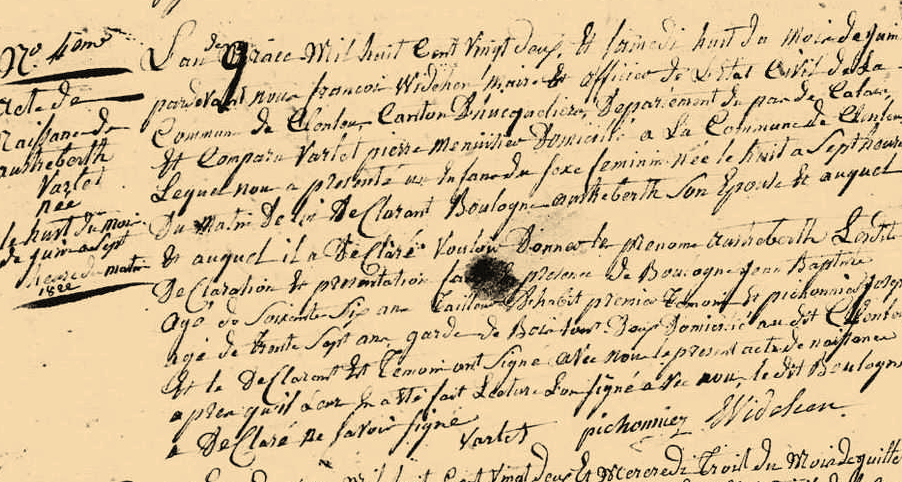
Cerenise dozed off, dreaming of the Folies Bergere. The atmosphere was exciting and convivial at first, escalating into an eruption of approval when the new act came on the stage. Cerenise felt the energy of the crowd but her attention was drawn to the flamboyant figure of a man dressed as one of the three kings of the Magi, and he was making his way over to her. Why, it was Lazuli Galore! What on earth was he doing here? And who was that dumpy overly made up woman in the blue dress, Godfreda, who had tagged along with them?
Another knock on the door wakened her and she called out “Come in!” in an irritable tone. She’d been having such fun in the dream. “Oh it’s you, oh good, the book has arrived.”
Laddie shifted his feet and replied, “Well yes, a Liz Tattler novel has arrived.”
“Oh, good, well be off with you then so I can get on with my work.”
“But it’s not The Vampires of Varna. It’s The Valedictorian Vampires of Valley View High.”
“Jolly good, I expect you’ll enjoy it,” Cerenise said, picking up the old document again and peering at it. Perceiving that Laddie had not yet exited the room, she looked up. “Helier won’t notice, those books are all the same. Now get off with you.”
January 3, 2026 at 8:09 pm #8025In reply to: The Hoards of Sanctorum AD26
As soon as Boothroyd had gone, Laddie Bentry, the under gardener, emerged from behind the Dicksonia squarrosa that was planted in a rare French Majolica Onnaing dragon eagle pot. The pot, and in particular the tree fern residing within it, were Laddie’s favourite specimen, reminding him of his homeland far away.
Keeping a cautious eye on the the door leading into the house, Laddie hurried over to the cast iron planter and retrieved the Liz Tattler novel hidden underneath. Quickly he tucked in into the inside pocket of his shabby tweed jacket and hastened to the door leading to the garden. Holding on to his cap, for the wind was cold and gusty, he ran to the old stable and darted inside. Laddie reckoned he had an hour or two free without Boothroyd hovering over him, and he settled himself on a heap of old sacks.
 The Vampire Hoarders of Varna. It wasn’t the first time Laddie had seen Boothroyd surreptitiously reading Helier’s books, and it had piqued his curiosity. What was it the old fart found so interesting about Helier’s novels? The library was full of books, if he wanted to read. Not bothering to read the preface, and not having time to start on page one, Laddie Bentry flicked through the book, pausing to read random passages.
The Vampire Hoarders of Varna. It wasn’t the first time Laddie had seen Boothroyd surreptitiously reading Helier’s books, and it had piqued his curiosity. What was it the old fart found so interesting about Helier’s novels? The library was full of books, if he wanted to read. Not bothering to read the preface, and not having time to start on page one, Laddie Bentry flicked through the book, pausing to read random passages.….the carriage rattled and lurched headlong through the valley, jostling the three occupants unmercifully. “I’ll have the guts of that coachman for garters! The devil take him!” Galfrey exclaimed, after bouncing his head off the door frame of the compartment.
“Is it bleeding?” asked Triviella, inadvertently licking her lips and she inspected his forehead.
“The devil take you too, for your impertinence,” Galfrey scowled and shook her off, his irritation enhanced by his alarm at the situation they found themselves in.
Ignoring his uncharacteristic bad humour, Triviella snuggled close and and stroked his manly thigh, clad in crimson silk breeches. “Just think about the banquet later,” she purred.
Jacobino, austere and taciturn, on the opposite seat, who had thus far been studiously ignoring both of them, heard the mention of the banquet and smiled for the first time since…
Laddie opened the book to another passage.
“……1631, just before the siege of Gloucester, and what a feast it was! It was hard to imagine a time when we’d feasted so well. Such rich and easy pickings and such a delightful cocktail. One can never really predict a perfect cocktail of blood types at a party, and centuries pass between particularly memorable ones. Another is long overdue, and one would hate to miss it,” Jacobino explained to the innocent and trusting young dairy maid, who was in awe that the handsome young gentleman was talking to her at all, yet understood very little of his dialogue.
“Which is why,” Jacobino implored, taking hold of her small calloused hands, “You must come with me to the banquet tonight.”
Little did she know that her soft rosy throat was on the menu…..
January 3, 2026 at 9:04 am #8023In reply to: The Hoards of Sanctorum AD26
“Quite fitting that I should get her sleeves,” Cerenise said with satisfaction. “And what a relief that she left the wolf to you, Spirius. I’d not have been able to manage a wolf.” Cerenise popped another cashew nut into her mouth.
Spirius looked at her with a raised eyebrow. “My guess is you’d have managed just fine,” he replied drily. He’d heard all the noise she made behind those locked doors. He’d seen her prancing around the orchard in the moonlight when she thought nobody was watching, naked as the day she was born all those centuries ago. He hadn’t lingered at the window, but he had put two and two together years ago, many years ago, just after the seige of Gloucester. If truth be told, Cerenise’s secret was known to them all, but they hadn’t interfered with her delusion.
“There’s going to come a point, and very soon, when we will have to deal with the water leak, you know,” Yvoise interrupted the inconsequential chatter. “Holy and healing as it may be, it will be the ruin of my collection if it reaches the upper floors.”
“And what do you propose?” asked Helier.
“I suggest we call a plumber!” snapped Yvoise. “This is the 21st century is it not? I know tradesmen are in short supply, and I know this isn’t an ordinary leak, but we should start with the obvious, and then adapt accordingly.”
“I must bottle as much of the holy water as possible before we stop the leak,” Spirius said, standing up abruptly in agitation.
Helier put a calming hand on the old boy’s shoulder. “There’s no rush, Spirius, there’s plenty of water in the cellars, it’s already waist deep down there.”
“And the saints only know what has floated into the cellars by now from the tunnels. Be careful down there, Spirius. Take Boothroyd the gardener with you,” Yvoise advised.
December 31, 2025 at 7:34 pm #8018In reply to: The Hoards of Sanctorum AD26
It must be two hundred years at least since we’ve heard a will read at number 26, Cerenise thought to herself, still in a mild state of shock at the unexpected turn of events. She allowed her mind to wander, as she was wont to do.
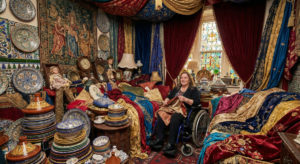 Cerenise had spent the best part of a week choosing a suitable outfit to wear for the occasion and the dressing room adjoining her bedroom had become even more difficult to navigate. Making sure her bedroom door was securely locked before hopping out of her wicker bath chair (she didn’t want the others to see how nimble she still was), she spent hours inching her way through the small gaps between wardrobes and storage boxes and old wooden coffers, pulling out garment after garment and taking them to the Napoleon III cheval mirror to try on. She touched the rosewood lovingly each time and sighed. It was a beautiful mirror that had faithfully reflected her image for over 150 years.
Cerenise had spent the best part of a week choosing a suitable outfit to wear for the occasion and the dressing room adjoining her bedroom had become even more difficult to navigate. Making sure her bedroom door was securely locked before hopping out of her wicker bath chair (she didn’t want the others to see how nimble she still was), she spent hours inching her way through the small gaps between wardrobes and storage boxes and old wooden coffers, pulling out garment after garment and taking them to the Napoleon III cheval mirror to try on. She touched the rosewood lovingly each time and sighed. It was a beautiful mirror that had faithfully reflected her image for over 150 years.Holding a voluminous black taffetta mourning dress under her chin, Cerenise scrutinised her appearance. She looked well in black, she always felt, and it was such a good background for exotic shawls and scarves. Pulling the waist of the dress closer, it became apparent that a whalebone corset would be required if she was to wear the dress, a dreadful blight on the fun of wearing Victorian dresses. She lowered the dress and peered at her face. Not bad for, what was it now? One thousand 6 hundred and 43 years old? At around 45 years old, Cerenise decided that her face was perfect, not too young and not too old and old enough to command a modicum of respect. Thenceforth she stopped visibly aging, although she had allowed her fair hair to go silver white.
It was just after the siege of Gloucester in 1643, which often seemed like just yesterday, when Cerenise stopped walking in public. Unlike anyone else, she had relished the opportunity to stay in one place, and not be sent on errands miles away having to walk all the way in all weathers. Decades, or was it centuries, it was hard to keep track, of being a saint of travellers had worn thin by then, and she didn’t care if she never travelled again. She had done her share, although she still bestowed blessings when asked.
It was when she gave up walking in public that the hoarding started. Despite the dwellings having far fewer things in general in those days, there had always been pebbles and feathers, people’s teeth when they fell out, which they often did, and dried herbs and so forth. As the centuries rolled on, there were more and more things to hoard, reaching an awe inspiring crescendo in the last 30 years.
Cerenise, however, had wisely chosen to stop aging her teeth at the age of 21.
Physically, she was in surprisingly good shape for an apparent invalid but she spent hours every day behind locked doors, clambering and climbing among her many treasures, stored in many rooms of the labyrinthine old building. There was always just enough room for the bath chair to enter the door in each of her many rooms, and a good strong lock on the door. As soon as the door was locked, Cerenise parked the bath chair in front of the door and spent the day lifting boxes and climbing over bags and cupboards, a part of herself time travelling to wherever the treasures took her.
Eventually Cerenise settled on a long and shapeless but thickly woven, and thus warm, Neolithic style garment of unknown provenance but likely to be an Arts and Crafts replica. It was going to be cold in the library, and she could dress it up with a colourful shawl.
September 21, 2025 at 9:24 pm #7973In reply to: The Precious Life and Rambles of Liz Tattler
“Whatever happened to Miss Mossy Trotter, Finnley?” Liz asked, conversationally. She had a good idea what had happened to that innovative story writer, but she wanted to hear what Finnley had to say, before she mentioned it to Godfrey.
“What to YOU think happened to her?” Finnley responded, in her customary rudely intuitive manner.
“Sit down on that stool for a minute, and put the feather duster down,” Liz instructed, “And let’s have a talk about this because we both know that the possible ramifications don’t bear thinking about. Now then, sit still for five minutes and tell me everything.”
Unseen by either of them, Roberto had sidled up to the French windows and was peering inside, listening.
July 16, 2025 at 6:06 am #7969In reply to: The Elusive Samuel Housley and Other Family Stories
Gatacre Hall and The Old Book
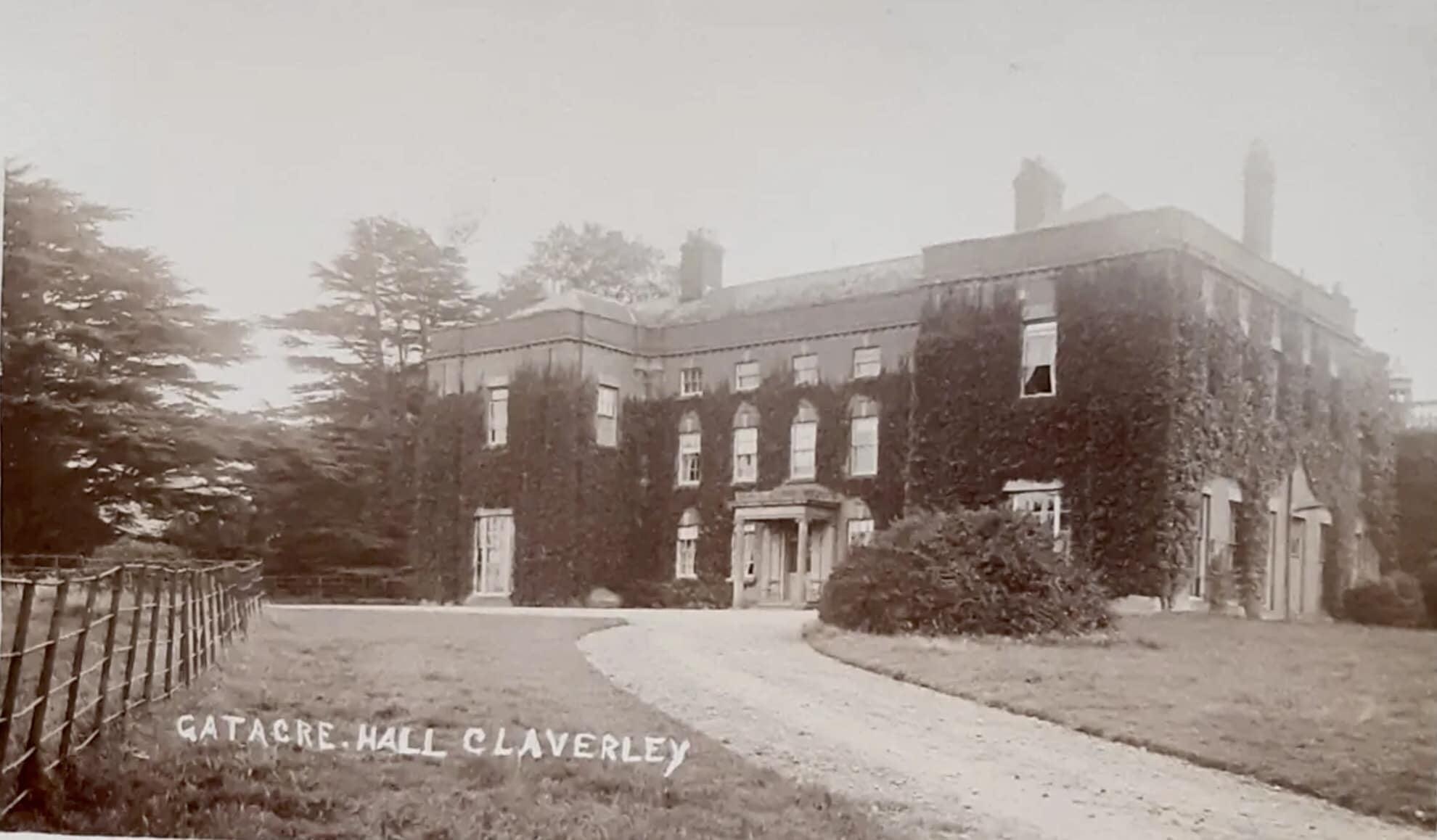
In the early 1950s my uncle John and his friend, possibly John Clare, ventured into an abandoned old house while out walking in Shropshire. He (or his friend) saved an old book from the vandalised dereliction and took it home. Somehow my mother ended up with the book.

I remember that we had the book when we were living in USA, and that my mother said that John didn’t want the book in his house. He had said the abandoned hall had been spooky. The book was heavy and thick with a hard cover. I recall it was a “magazine” which seemed odd to me at the time; a compendium of information. I seem to recall the date 1553, but also recall that it was during the reign of Henry VIII. No doubt one of those recollections is wrong, probably the date. It was written in English, and had illustrations, presumably woodcuts.
I found out a few years ago that my mother had sold the book some years before. Had I known she was going to sell it, I’d have first asked her not to, and then at least made a note of the name of it, and taken photographs of it. It seems that she sold the book in Connecticut, USA, probably in the 1980’s.
My cousin and I were talking about the book and the story. We decided to try and find out which abandoned house it was although we didn’t have much to go on: it was in Shropshire, it was in a state of abandoned dereliction in the early 50s, and it contained antiquarian books.
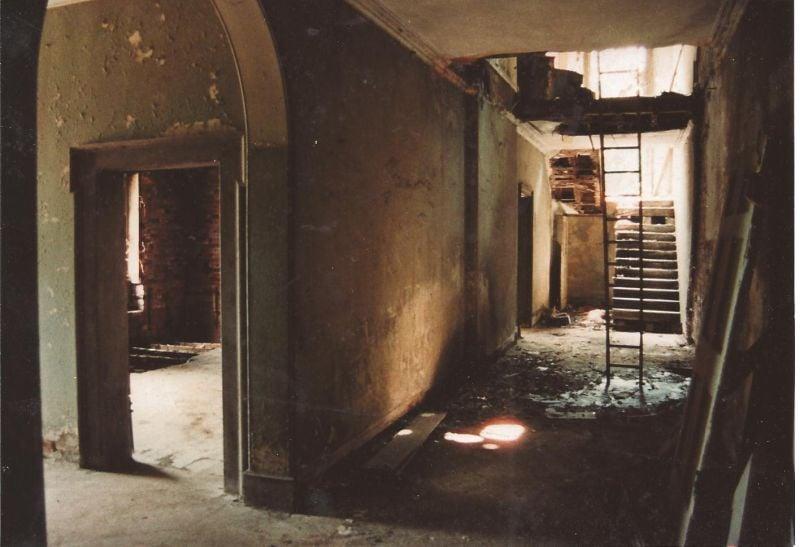
I posted the story on a Shropshire History and Nostalgia facebook group, and almost immediately had a reply from someone whose husband remembered such a place with ancient books and manuscripts all over the floor, and the place was called Gatacre Hall in Claverley, near Bridgnorth. She also said that there was a story that the family had fled to Canada just after WWII, even leaving the dishes on the table.
The Gatacre family sailing to Canada in 1947:
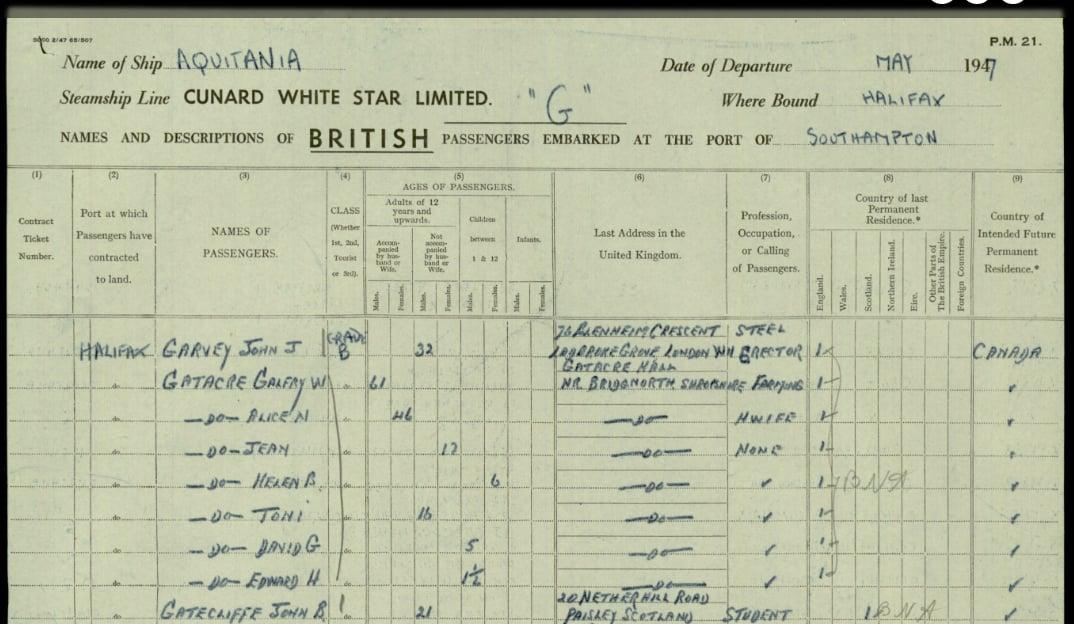
When my cousin heard the name Gatacre Hall she remembered that was the name of the place where her father had found the book.
I looked into Gatacre Hall online, in the newspaper archives, the usual genealogy sites and google books searches and so on. The estate had been going downhill with debts for some years. The old squire died in 1911, and his eldest son died in 1916 at the Somme. Another son, Galfrey Gatacre, was already farming in BC, Canada. He was unable to sell Gatacre Hall because of an entail, so he closed the house up. Between 1945-1947 some important pieces of furniture were auctioned, and the rest appears to have been left in the empty house.
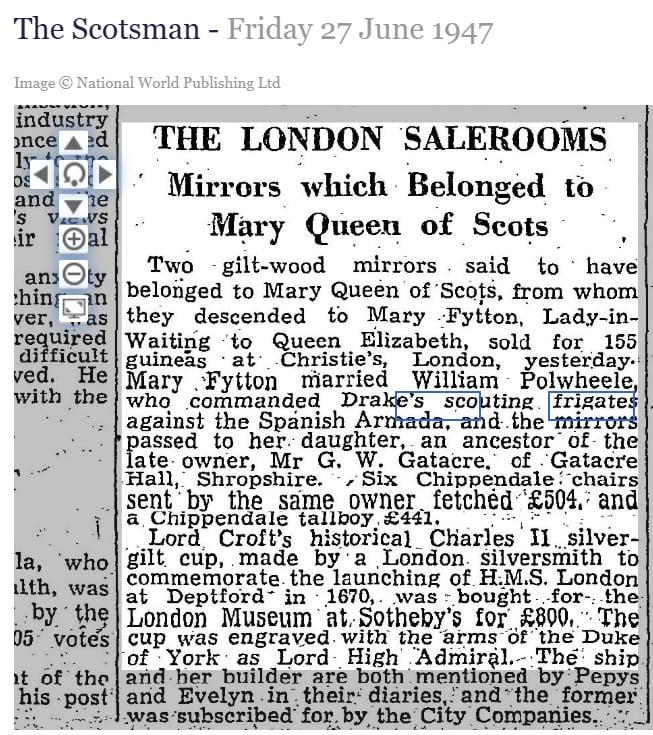
The family didn’t suddenly flee to Canada leaving the dishes on the table, although it was true that the family were living in Canada.
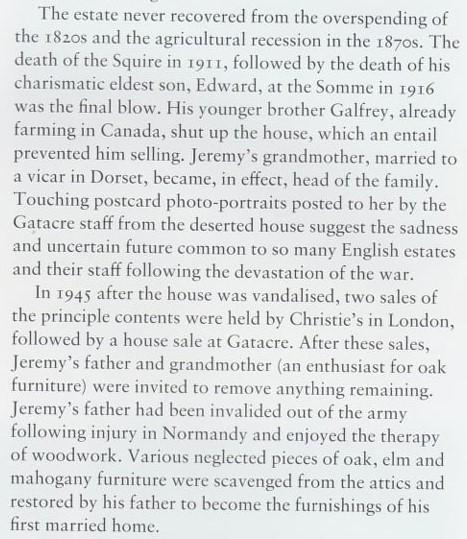
An interesting thing to note here is that not long after this book was found, my parents moved to BC Canada (where I was born), and a year later my uncle moved to Toronto (where he met his wife).
Captain Gatacre in 1918:
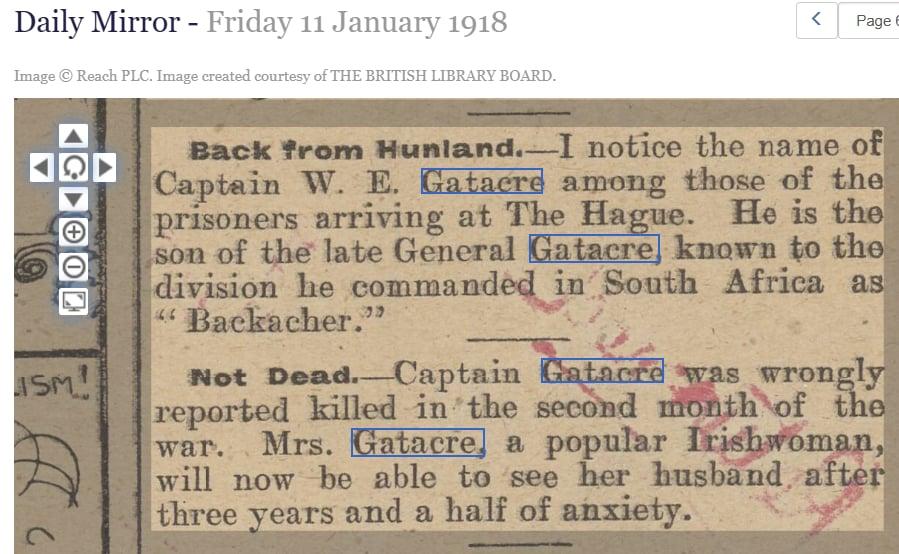
The Gatacre library was mentioned in the auction notes of a particular antiquarian book:
“Provenance: Contemporary ownership inscription and textual annotations of Thomas Gatacre (1533-1593). A younger son of William Gatacre of Gatacre Hall in Shropshire, he studied at the English college at the University of Leuven, where he rejected his Catholic roots and embraced evangelical Protestantism. He studied for eleven years at Oxford, and four years at Magdalene, Cambridge. In 1568 he was ordained deacon and priest by Bishop of London Edmund Grindal, and became domestic chaplain to Robert Dudley, 1st Earl of Leicester and was later collated to the rectory of St Edmund’s, Lombard Street. His scholarly annotations here reference other classical authors including Plato and Plutarch. His extensive library was mentioned in his will.”
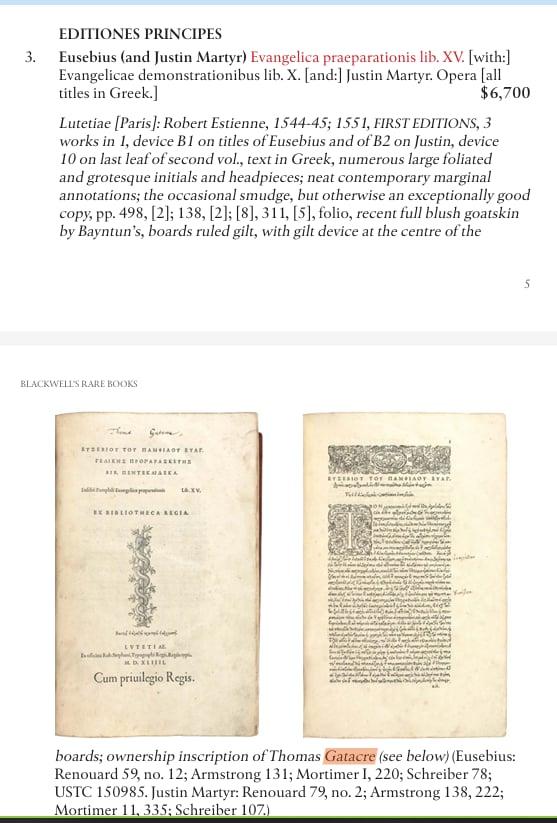
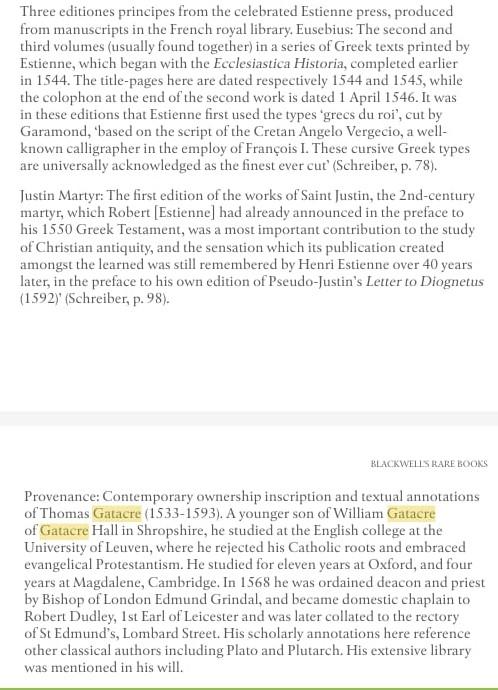
There are thirty four pages in this 1662 book about Thomas Gatacre d 1654:

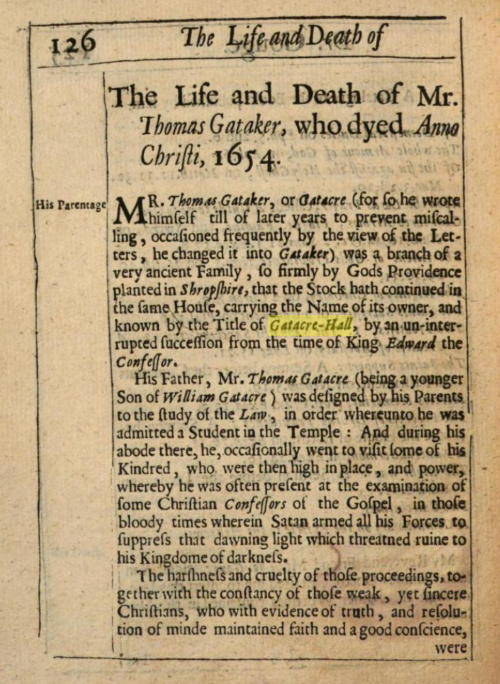 June 14, 2025 at 8:13 pm #7963
June 14, 2025 at 8:13 pm #7963In reply to: Cofficionados Bandits (vs Lucid Dreamers)
“Well, I think that proves my point,” remarked Carob with a smirk.
“What do you mean”, Thiram said crossly, which sounded more like a resigned sigh than a question.
“Remember what I said? You can’t order a synchronicity, or expect one. They always just happen when you don’t expect it.”
“She’s right,” Any piped up. “We can’t just sit here waiting for a coincidence. We have to just carry on regardless until one appears.”
“Aunt Amy?” Kit asked, “How do we carry on regardless if we don’t know what our story is yet?”
“What I want to know is this,” Chico said with a twirl of his worry beads, “Who’s coming with me to fetch the gazebo back?” Chico squared his shoulders proudly, glad that his new colourful beads had replaced the urge to spit. He felt in control, a new man. A man to be respected. A leader.
With an elaborate triple reverse double flip of the worry beads, Chico turned and strode purposefully into the sunset, in the direction of the gazebo.
June 11, 2025 at 7:50 pm #7962In reply to: Cofficionados Bandits (vs Lucid Dreamers)
The hat was gone.
Kit stood blinking in the sun, the shape of his new self cooling around the edges like a half-written cookie losing form. Without the cowboy hat, the lasso made less sense. His accent wobbled, then vanished completely. The sunglasses stayed, but now just made everything too dark, even tinted pink.
Behind him, the gazebo creaked again. But no trapdoor this time—only a faint whirring, like a film projector syncing spools.
“It’s reloading,” said Thiram from the sidelines, tapping at something that looked oddly like a pressure-gauged Sabulmantium. “Every time someone hands off a narrative object—like a synch, a hat, a horse even—it updates roles. We’re being cast on the fly.”
Chico looked up from Tyrone, who had snatched one of the Memory Pies and was now attempting to hide the evidence behind a flowerpot. “So… Kit’s not Trevor anymore?”“No,” said Carob, arms crossed. “He’s Trevorless. That identity didn’t bake fully. We have to stabilize it.”
“But with what?” asked Godrick, who had returned carrying a second cocktail, coffee with a glass of water and a slight wry smirk.
Amy, now balancing the cowboy hat on her head as she crouched next to the still-disoriented Padre, called out without turning:
“Bring him another Synch. That’s how it works now, apparently. Hat or otherwise.”
June 11, 2025 at 6:26 pm #7961In reply to: Cofficionados Bandits (vs Lucid Dreamers)
Amy rushed over to Kit when she saw what had happened and said, “Kit, give me your hat!”
Tentatively Kit put his hand on his head and sure enough he felt a hat upon it. Carefully he removed it and wonderingly gazed at the cowboy hat. He loved it! Just looking at the hat was already giving him ideas for his character, newly baked memories were starting to slide in like a tray of chocolate chip cookies on a baking sheet, pulled out of the oven at the perfect golden melting moment.
But Amy wants it! I can’t say no to her, but I want to keep it. It’s my first hat! Kit was close to tears.
“Oh poppet,” Amy said kindly when she noticed his face. Giving him a quick hug she explained. “I only want to borrow it, just to keep the Padre happy. He keeps asking where his hat is. I’ll bring it back as soon as we’ve settled him back at home.”
The releif was immense, and he graciously surrendered the hat to Aunt Amy. “Did you call me Poppet?” he asked. “Because Thiram just called me Trevor.”
“To me, you’ll always be Kit,” Amy said as she rushed back to her father. “See you later, Poppet!” she called over her shoulder.
“What does that mean?” asked Kit, but Amy had gone.
June 11, 2025 at 10:13 am #7959In reply to: Cofficionados Bandits (vs Lucid Dreamers)
“Buns and tarts!” called a street vendor from the street outside the Gazebar. “Freshly baked Memory Pies! Nostalgia Rolls! Selling like Hot Cakes! Come and get ’em before they run out!”
Chico realised he’d hardly eaten a thing since becoming a new character. Maybe this is how character building works.
“I’ll take one of each,” Chico said to the smiling round faced vendor. I need to stock up on memories.
“Are they all for you, sir?” the vendor asked. Chico couldn’t help thinking he looked like a frog. Nodding, Chico said, “Yeah, I’m hungry for a past.”
“We normally suggest just one at a time,” the frog said (for he had indeed turned into a frog), “But you look like a man with a capacity for multiple memories. Are you with friends?”
“Er, yeah, yes I’m with friends,” Chico replied. Are the other new characters my friends? “Yes, of course, I have lots of friends.” He didn’t want the frog vendor to think he was friendless.
“Then we suggest you share each cake with the friends you want to share the memory with.”
“Oh right. But how do I know what the memory is before I eat the cake?”
“Let me ask you this,” said the frog with a big smile, “Do real people choose who to share their memories with? Or know in advance what the memories will be?”
“How the hell would I know!” Chico said, roughly grabbing the paper bag of buns. “I’m new here!”
June 10, 2025 at 7:59 pm #7957In reply to: Cofficionados Bandits (vs Lucid Dreamers)
Still visibly shaken, Sir Humphrey blinked up at the canopy. “Is it… raining? Is it raining ants?”
“It’s not rain,” muttered Thiram, checking his gizmos. “Not this time. It’s like… gazebo fallout. I’d venture from dreams hardening midair.”
Kit shuffled closer to Amy, speaking barely above a whisper. “Aunt Amy, is it always like this?”
Amy sighed, pinched the bridge of her nose, and said, “No, sweetheart. Sometimes it’s worse.”
“Right then,” declared Carob, making frantic gestures in the air, as though she’d been sparring the weather. “We need to triangulate the trajectory of the gazebo, locate the Sabulmantium, and get Sir Humphrey a hat before his dignity leaks out his ears.”
“I feel like Garibaldi,” Sir Humphrey murmured, dazedly stroking his forehead.
“Do you remember who Garibaldi is?” Chico asked, narrowing his eyes.
“No,” the Padre confessed. “But I’m quite certain he’d never have let his gazebo just float off like that.”
Meanwhile, Madam Auringa had reappeared behind a curtain of mist smelling faintly of durian and burnt cinnamon.
“The Sabulmantium has been disturbed,” she intoned. “Intent without anchor will now spill into unintended things. Mice shall hold council. Socks will invert themselves. Lost loves shall write letters that burn before reading.”
“Typical,” muttered Thiram. “We poke one artifact and the entire logic stack collapses.”Kit raised a trembling hand. “Does that mean I’m allowed to choose my name again?”
“No,” said Amy, “But you might be able to remember your original one—depending on how many sand spirals the Sabulmantium spins.”
“I told you,” Chico interjected, gesturing vaguely at where the gazebo had vanished over the treetops. “It was no solar kettle. You were all too busy caffeinating to notice. But it was focusing something. That sand’s shifting intent like wind on a curtain.”
“And we’ve just blown it open,” said Carob.
“Yup,” said Amy. “Guess we’re going gazebo-chasing.”
June 7, 2025 at 7:32 am #7955In reply to: Cofficionados Bandits (vs Lucid Dreamers)
The wind picked up just as Thiram adjusted the gazebo’s solar kettle. At first, he blamed the rising draft on Carob’s sighing—but quickly figured out that this one had… velocity.
Then the scent came floating by: jasmine, hair spray, and over-steeped calamansi tea.
A gust of hot air blew through the plantation clearing, swirling snack wrappers and curling Amy’s page corners. From the vortex stepped a woman, sequins ablaze, eyeliner undefeated.
She wore a velvet shawl patterned like a satellite weather map.
“Did someone say Auringa?” she cooed, gliding forward as her three crystal balls rotated lazily around her hips like obedient moons.
“Madam Auringa?” Kit asked, wide-eyed.Thiram’s devices were starting to bip, checking for facts. “Madam Auringa claims to have been born during a literal typhoon in the Visayas, with a twin sister who “vanished into the eye.” She’s been forecasting mischief, breakups, and supernatural infestations ever since…”
Carob raised an eyebrow. “Source?”
Humphrey harrumphed: “We don’t usually invite atmospheric phenomena!”
“Doctor Madam Auringa, Psychic Climatologist and Typhoon Romantic,” the woman corrected, removing a laminated badge from her ample bosom. “Bachelor of Arts in Forecasted Love and Atmospheric Vibes. I am both the typhoon… and its early warning system.”
“Is she… floating?” Amy whispered.
“No,” said Chico solemnly, “She’s just wearing platform sandals on a bed of mulch.”
Auringa snapped her fingers. A steamy demitasse of kopi luwak materialized midair and plopped neatly into her hand. It wasn’t for drink, although the expensive brevage born of civet feces had an irrepressible appeal —it was for her only to be peered into.
“This coffee is trembling,” she murmured. “It fears a betrayal. A rendezvous gone sideways. A gazebo… compromised.”
Carob reached for her notes. “I knew the gazebo had a hidden floor hatch.”
Madam Auringa raised one bejeweled finger. “But I have come with warning and invitation. The skies have spoken: the Typhoon Auring approaches. And it brings… revelations. Some shall find passion. Others—ant infestations.”
“Did she just say passion or fashion?” Thiram mumbled.
“Both,” Madam Auringa confirmed, winking at him with terrifying precision.
She added ominously “May asim pa ako!”. Thiram’s looked at his translator with doubt : “You… still have a sour taste?”
She tittered, “don’t be silly”. “It means ‘I’ve still got zest’…” her sultry glance disturbing even the ants.
June 6, 2025 at 6:02 pm #7954In reply to: Cofficionados Bandits (vs Lucid Dreamers)
Another one! A random distant memory wafted into Amy’s mind. Uncle Jack always used to say GATZ e bo. Amy could picture his smile when he said it, and how his wife always smiled back at him and chuckled. Amy wondered if she’d even known the story behind that or if it had always been a private joke between them.
“What’s been going on with my gazebo?” Amy’s father rushed into the scene. So that’s what he looks like. Amy couldn’t take her eyes off him, until Carob elbowed her in the neck.
“Sorry, I meant to elbow you in the ribs, but I’m so tall,” Carob said pointlessly, in an attempt to stop Amy staring at her father as if she’d never seen him before.
Thiram started to explain the situation with the gazebo to Amy’s father, after first introducing him to Kit, the new arrival. “Humphrey, meet Kit, our new LBGYEQCXOJMFKHHVZ story character. Kit, this is Amy’s father who we sometimes refer to as The Padre.”
“Pleased to meet you, ” Kit said politely, quaking a little at the stern glare from the old man. What on earth is he wearing? A tweed suit and a deerstalker, in this heat! How do I know that’s what they’re called? Kit wondered, quaking a little more at the strangeness of it all.
“Never mind all that now!” Humphrey interrupted Thiram’s explanation.
Still as rude as ever! Amy thought.
“I’ve too much to think about, but I’ll tell you this: I’ve planned a character building meeting in the gazebo, and you are all invited. As a matter of fact,” Humphrey continued, “You are all obliged to attend. If you choose not to ~ well, you know what happened last time!”
“What happened last time?” asked Carob, leaning forward in anticipation of an elucidating response, but Humphrey merely glared at her.
Amy sniggered, and Humphrey shot her a lopsided smile. “YOU know what happened in Jack’s GATZ e bo, don’t you, my girl?”
Where were those random memories when you wanted them? Amy had no idea what he was talking about.
“Who else is invited, Humph? asked Chico, resisting the urge to spit.
“My good man,” Humphrey said with a withering look. “Sir Humphrey’s the name to you.”
Sir? what’s he on about now? wondered Amy. Does that make me a Lady?
“Who else is invited, Padre?” Amy echoed.
Humphrey pulled a scroll tied with a purple ribbon out of his waistcoat pocket and unfurled it. Clearing his throat importantly, he read the list to all assembled.
Juan and Dolores Valdez.
Godric, the Swedish barman
Malathion and Glyphosate, Thiram’s triplet brothers. Mal and Glyph for short.
Liz Tattler
Miss Bossy Pants
Goat Horned Draugaskald“Did I forget anyone?” Humphrey asked, peering over his spectacles as he looked at each of the characters. “You lot,” he said, “Amy, Carob, Thiram, Chico, Kit and Ricardo: you will be expected to play hosts, so you might want to start thinking about refreshments. And not,” he said with a strong authoritarian air, “Not just coffee! A good range of beverages. And snacks.”
Thiram, leaning against a tree, started whistling the theme tune to Gone With The Wind. Tossing an irritated glance in his direction, Carob roughly gathered up her mass of frizzy curls and tethered it all in a tight pony tail. I still don’t know what happened before, she fumed silently. The latest developments where making her nervous. Would they find out her secret?
“You guys,” called Chico, who had wandered over to the gazebo. “It’s full of ants.”
May 23, 2025 at 9:19 pm #7951In reply to: Cofficionados Bandits (vs Lucid Dreamers)
Disgruntled and bored with the fruitless wait for the other characters to reveal more of themselves, Amy started staying in her room all day reading books, glad that she’d had an urge to grab a bag full of used paperbacks from a chance encounter with a street vendor in Bogota.
A strange book about peculiar children lingered in her mind, and mingled somehow with the vestiges of the mental images of the writhing Uriah in the book Amy had read prior to this one.
Aunt Amy? a childs voice came unbidden to Amys ear. Well, why not? Amy thought, Some peculiar children is what the story needs. Nephews and neices though, no actual children, god forbid.
“Aunt Amy!” A gentle knocking sounded on the bedroom door. “Are you in there, Aunt Amy?”
“Is that at neice or nephew at my actual door? Already?” Amy cried in amazement.
“Can I come in, please?” the little voice sounded close to tears. Amy bounded off the bed to unloock leaving that right there the door to let the little instant ramen rellie in.
The little human creature appeared to be ten years old or so, as near as Amy could tell, with a rather androgenous look: a grown out short haircut in a nondescript dark colour, thin gangling limbs robed in neutral shapelessness, and a pale pinched face.
“I’ve never done this before, can you help me?” the child said.
“Never been a story character before, eh?” Amy said kindly. “Do you know your name? Not to worry if you don’t!” she added quickly, seeing the child’s look of alarm. “No? Well then you can choose what ever you like!”
The child promptly burst into tears, and Amy wanted to kick herself for being such a tactless blundering fool. God knows it wasn’t that easy to choose, even when you knew the choice was yours.
Amy wanted to ask the child if it was a boy or a girl, but hesitated, and decided against it. I’ll have to give it a name though, I can’t keep calling it the child.
“Would you mind very much if I called you Kit, for now?” asked Amy.
“Thanks, Aunt Amy,” Kit said with a tear streaked smile. “Kit’s fine.”
May 16, 2025 at 3:20 am #7935In reply to: Cofficionados Bandits (vs Lucid Dreamers)
“I don’t know, Amy. I thought it was Chico who was mysterious — subversively spitting at every opportunity.”
“Well, Carob, maybe we could just agree they’re equally mysterious?” suggested Amy, turning her attention back to her search.
Carob shrugged. “A woman in Greece is divorcing her husband because AI read her coffee cup and said he was cheating.”
Amy paused and looked up. “For real?”
“Yeah. I read it on Thiram’s news stream. He left it running on that weird device of his — over there, next to his half-drunk coffee. Not sure where he went, actually.”
Amy gasped and clapped her hands. “Oh! Oh! Brainwave occurring — let’s get AI to read Thiram’s coffee cup!”
Carob snorted. “Genius.”
They raced over to the small folding table where Thiram’s cup sat. Carob held up her phone.
“Okay. One quick pic. Hold it steady!”
They excitedly uploaded the image to an AI analysis app Thiram had installed on his device.
The app whirred for a few minutes:
DEEP COFFEE CUP ANALYSIS COMPLETE
Latent emotional residue: contemplative, fond of secrets.
Foam pattern suggests hidden loyalty to an entity known only as “The Port.”
Swirling suggests alignment with larger forces not currently visible.
Presence of cardamom notes: entirely unaccounted for.
Recommendation: approach carefully with gentle questioning.“Blimey, what does that mean?” asked Carob.
Amy nodded solemnly, perhaps with just a touch of smugness. “He is a man of mystery. Didn’t I say it?”
May 10, 2025 at 10:01 am #7931In reply to: Cofficionados Bandits (vs Lucid Dreamers)
Carob wrinkled her nose in distaste and languidly remarked, “Amy, that goaty odour seems to be emanating from your clothing. Does it perchance require laundering?”
Chico laughed loudly, spitting equally audibly. “Hi,” he said, “The name’s Chico,” emerging from behind the tulip tree.
Carob winced at the spitting, and Amy writhed a little at being humiliated in front of the man. They both ignored him, and he regretted not staying hidden.
“I’ve just pegged out two loads of washing, for your information, not that it will dry in this rain,” Amy said, quickly tying her hair back in annoyance. Does this move the story forward? she wondered. Why do I have a smelly character anyway? I’m sweaty, goaty and insecure, how did it happen?
“Never mind that anyway, have you seen what’s on todays news?” Carob asked, feeling sorry for making Amy uncomfortable.
“I have,” remarked Chico, with a hopeful expression, but the women ignored him.
May 5, 2025 at 5:55 pm #7915In reply to: Cofficionados Bandits (vs Lucid Dreamers)
Amy supposed everyone was blaming her, for what she couldn’t say, but they had clearly been avoiding her. There was plenty of coffee here anyway, even if the rest of the world was suffering. Don’t even think it, she told herself sternly. We don’t want people flocking here in droves once they realise.
So, do I want people or not? she asked herself. One minute I’m wondering where everyone is, and then next minute I’m wanting everyone to stay away.
“You on the spectrum too, are you?” asked Carob, reading her mind. “It’s ok,” she added, seeing the look of alarm cross Amy’s face, “Your secret’s safe with me. I mean about being on the spectrum. But be careful, they’re rounding people like us up and sending them to a correctional facility. We’re quite lucky to be here, out of the way.”
“Have you been avoiding me?” Amy asked, which was more immediately concerning than the concentration camps. “Because I’ve been here all alone for ages, nothing to do but read my book, draw in my sketch pad, and work on my needlepoint cushion covers. And where are the others? And don’t read my mind, it’s so rude.”
“Needlepoint cushion covers? Are you serious?” Carob was avoiding the questions, but was genuinely curious about the cushion covers.
Amy blushed. “No, I made that up. In fact, I don’t know what made me say that. I haven’t started any sketching either, but I have thought about starting sketching. And I’ve been reading. It’s an old Liz Tattler; the old ones were the best. Real old school Lizzie Tattie, if you know what I mean. Risque romps with potting sheds and stuff. None of that ghastly sci fi she started writing recently.”
“Which one?” Carob asked, and laughed when Amy held it up. “I read that years ago, T’Eggy Gets a Good Rogering, can I borrow it after you? God knows we could all do with a laugh.”
“How do you know the others need a good laugh?” Amy asked, peering at Carob with an attentive squint in order to catch any clues. “You’ve seen then, then?”
Carob smiled sadly and replied, “Only by remote viewing them.”
Amy asked where they had been and what they were doing when they were viewed remotely. Has she been remote viewing me? What if they ask her if she’s been remote viewing me, and she tells them? “Oh never mind,” Amy said quickly, “No need to answer that.”
Carob snorted, and what a strangely welcome sound it was. “I didn’t really remote view them, I made that up. It never works if I try to spy on people. Fat lot of good it is really, it never works when I really really need to see something. Or maybe it works, but I never believe it properly until later when I find out it was right.”
“Yeah,” Amy said, “It’s fun though, I haven’t done it in ages.”
“You should, it would give you something to do when everyone’s avoiding you.”
-
AuthorSearch Results